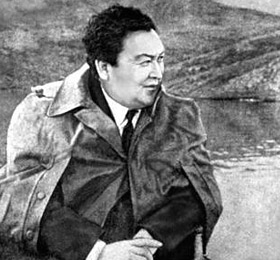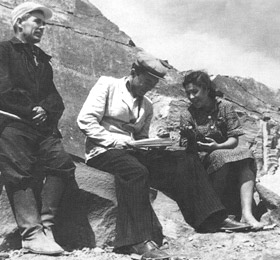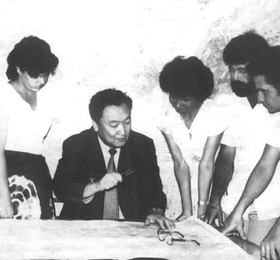Zhanar Tanirbergenova
Specialization: backend engineer. Internship: Stilt Inc., USA.
 Zhanar Tanirbergenova, a 22-year-old of Almaty, won a grant to take an internship at one of the Silicon Valley IT startups. She nailed it, despite the fact that the competition was really strong. This happened in 2019, right before the pandemic broke out, but Galimzhan Yessenov, the founder of Shakhmardan Yessenov Foundation promised all the winners that the institution would fulfill its obligations as soon as Kazakhstanis had the opportunity to travel abroad. That’s what exactly followed in 2021: Zhanar worked for 9 months at an American startup. Here’s her interview about the competition and what it’s like to work in a tech startup.
Zhanar Tanirbergenova, a 22-year-old of Almaty, won a grant to take an internship at one of the Silicon Valley IT startups. She nailed it, despite the fact that the competition was really strong. This happened in 2019, right before the pandemic broke out, but Galimzhan Yessenov, the founder of Shakhmardan Yessenov Foundation promised all the winners that the institution would fulfill its obligations as soon as Kazakhstanis had the opportunity to travel abroad. That’s what exactly followed in 2021: Zhanar worked for 9 months at an American startup. Here’s her interview about the competition and what it’s like to work in a tech startup.
How, why and when did you choose IT as your career field?
At school I was good at technical subjects, I studied at lyceums #165 and #134, participated in Olympiads in physics and chemistry. In the 11th grade, I have been choosing between Chemical Engineering and Information Technology for a long time. And my final choice was done in favor of the latter, as I was attracted by the demand and mobility of the speciality. My older brother, who is also a programmer, also had a big influence on my choice.
What can you say to those who still believe that “this is not a woman’s business”?
A very stupid opinion, I don’t understand how one can think like that nowadays. All people, regardless of gender, have the same rights to education and training, which means that men and women can equally become whoever they want. Of course, there are fewer women in technical professions than men, but this difference is rapidly decreasing. Moreover, according to research, companies where the percentage of employees of different genders is approximately the same are more successful and productive. I have no doubt that this stereotype will soon become obsolete.
Zhanar, what did you remember vividly from the foundation’s competition? What does it take to win?
The brightest moment was when they called and told me that I had won a grant! I was at work and felt so excited that I couldn’t focus on the work routine anymore and asked to take day off. I remember that the whole process of the competition was difficult and exciting. In the first round I think it helped me much that I carefully approached the writing of a motivational letter. I tried to make it succinct, interesting and memorable. I started preparing for the second round (technical interview) in advance, ‘cause it was the most difficult stage. The interview went approximately an hour and a half. In Zoom I had to solve problems and answer additional technical questions from the foundation’s experts. For successful completion, I advise everyone to improve their knowledge in the field of algorithms and data structures. There was also a third round – a psychological test for logic and stress resistance. If the first two stages are passed, this one will no longer cause difficulties.
How was the search for startups going?
I remember that I started the process in November. In the USA, this is an inactive pre-holiday period, but I was lucky – I found several startups, went through all the interviews and received several offers. Among them I chose the one that worked in the field of financial technology, as this industry was interesting and familiar to me (I worked in a bank). I successfully signed a contract with a startup until February 2020 – the moment when the pandemic was declared. After that, most companies stopped inviting specialists from abroad to come to the United States, preferring to work with them remotely. So I advise to never to delay or stretch the search process, as the world is changing rapidly.
Where and how did you complete the internship?
In the fintech startup Stilt Inc. It’s a company in San Francisco. It has been in existence for more than 5 years and provides loans to immigrants. In the USA, it is very important to have a good credit rating, a lot depends on it, and its absence greatly complicates the life of newcomers. It is such people precisely that the startup helps – it gives loans and allows them to create a good credit history. In addition, it is also developes in the direction of B2B, providing lending functionality to companies.
What have you managed to achieve, Zhanar?
I have developed a functionality that allows users to make international transactions to 47 countries of the world with currency conversion. It was popular with customers and the total amount of transactions grew from month to month. I have completed the full development cycle: architectural design of the system, code writing, testing and release. Probably, this is one of the most important advantages of working in a startup compared to large companies – because of the great responsibility assigned to you, you learn and grow as a professional much faster.
What problems did you have during the relocation, what life hacks can you share?
The move was accompanied by a large number of everyday problems. Language! I’m fine with English, but it took me a while to learn to understand different accents and get used to the pace of speech. And there was also a culture shock and a problem with finding housing for reasonable money. All this is not easy when you are alone. My advice to future winners is to stick together. In the past, the winners of this Yessenov Foundation program often flew to America at the same time and therefore rented housing together – so they managed to save on rent. In my case, I was alone, and the expenses turned out to be impressive.
What do you do now?
I continue to cooperate with Stilt Inc., I have been working in the company for two and a half years, now I am a senior programmer and I labour remotely from another country.
Zhanar, what are your plans for life and career for the next couple of years?
I was thinking of continuing my professional development. I’m also thinking of joining my brother’s programming school and becoming a teacher to share knowledge and experience with beginners.
Your interests?
In my free time, I like to cook. In the USA, I didn’t really like local restaurants and delivery – it didn’t cost cheap and it was difficult to find dishes familiar to us on the menu. That’s why I cook a lot. And I also like to travel.
20.12.22, Stories
Seen by: 1,065





